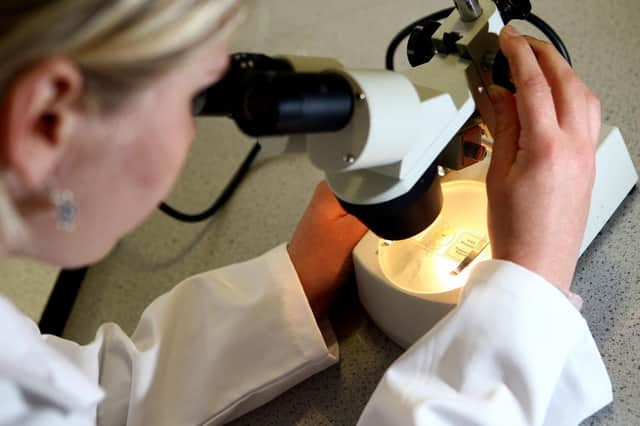Almost two fifths of cancers diagnosed at late stage


The National Cancer Diagnosis Audit analysed details of 2,318 new cases diagnosed between October 1 2018 and September 30 2019 – representing about 7 per cent of all cancer diagnoses over the period.
While just over a third (34.1 per cent) of patients were diagnosed with early stage cancer – either stage 1 or stage 2 – in almost two fifths (37.7 per cent) of cases the disease was not confirmed until it was either at stage 3 or stage 4.
Advertisement
Hide AdAdvertisement
Hide AdThe report, by Public Health Scotland, also found that almost a third (32.6 per cent ) of patients were considered by their GP to have had an “avoidable delay to their diagnosis” – which may have occurred before they first went to a doctor, while they were waiting to be referred or after this.
Dr Jana Witt, the clinical engagement manager for Cancer Research UK, said that “many cancers” were diagnosed later on, when “more limited” treatments were available.
The most common form of cancer diagnosed in the cases included in the audit was lung cancer, with 347 cases during the year.
There were also 315 cases of bowel cancer, 297 cases of breast cancer and 288 diagnoses of prostate cancer.
Almost two thirds (65 per cent) were picked up after patients visited their GP with symptoms, with GPs doing some investigations – most commonly blood tests – in just over half (51.4 per cent) of cases.
With the cases all pre-dating the coronavirus crisis, Dr Witt said: “The audit shows us that, even before the pandemic, many cancers were being diagnosed at a later stage when treatment options are more limited.
“The situation for many lung cancer patients is very worrying indeed.”
She added: “Since this audit, there have been welcome efforts to ensure patients are diagnosed sooner, including the establishment of Early Cancer Diagnostic Centres, an initiative outlined in the Scottish Government’s National Cancer Recovery Plan.
Advertisement
Hide AdAdvertisement
Hide Ad“As cancer services recover from Covid-19, the information provided in this report will help GPs identify areas of improvement to ensure the best possible care to patients.
“But it’s clear that much more needs to be done, including greater investment in the specialist staff urgently needed to diagnose more cancers earlier.
“Longstanding staff shortages must be addressed to ensure everyone gets the tests they need, when they need them.
“Long-term plans are also required to make sure Scotland’s NHS has a workforce that’s fit for the future.”
A Scottish Government spokeswoman said: “Although this audit was voluntary and not representative of all cancers diagnosed in Scotland, we welcome the results and opportunities to support improvements in the management and referral of patients with a suspicion of cancer.
“Some cancers and symptoms are more difficult to diagnose and may require more than one consultation, but it is reassuring that the average wait in primary care before onward referral was only three days.”
With 90 GP practices taking part in the audit, the spokeswoman said it would allow these practices to “review pathways to cancer diagnosis, benchmark current practice and identify areas for improvement”.